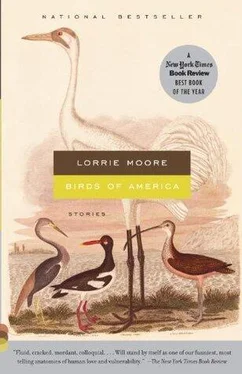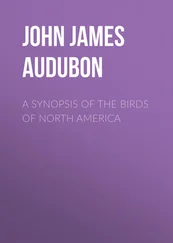“You always seem more interested in other women than in me,” Debbie says when they are back at his house after a silent ride home, Debbie driving. “Last month it was Lina. And the month before that it was … it was Lina again.” She stops for a minute. “I’m sorry to be so selfish and pathetic.” She begins to cry, and as she does, something cracks open in her and Bill sees straight through to her heart. It is a good heart. It has had nice parents and good friends, lived only during peacetime, and been kind to animals. She looks up at him. “I mean, I’m romantic and passionate. I believe if you’re in love, that’s enough. I believe love conquers all.”
Bill nods sympathetically, from a great distance.
“But I don’t want to get into one of these feeble, one-sided, patched-together relationships — no matter how much I care for you.”
“Whatever happened to love conquers all, just four seconds ago?”
Debbie pauses. “I’m older now,” she says.
“You kids. You grow up so fast.”
Then there is a long silence between them, the second in this new New Year. Finally, Debbie says, “Don’t you know that Lina’s having an affair with Albert? Can’t you see they’re in love?”
Something in Bill drops, squares off, makes a neat little knot. “No, I didn’t see.” He feels the sickened sensation he has sometimes felt after killing a housefly and finding blood in it.
“You yourself had suggested they might be lovers.”
“I did? Not seriously. Really? I did?”
“But Bill, hadn’t you heard? I mean, it’s all over campus.”
Actually, he had heard some rumors; he had even said, “Hope so” and once “May God bless their joyous union.” But he hadn’t meant or believed any of it. Such rumors seemed ham-handed, literal, unlikely. And yet wasn’t reality always cheesy and unreliable just like that; wasn’t fate literal in exactly that way? He thinks of the severed, crossed fingers found perfectly survived in the wreckage of a local plane crash last year. Such fate was contrary and dense, like a dumb secretary, failing to understand the overall gestalt and desire of the wish. He prefers a deeper, cleverer, even tardy fate, like that of a girl he knew once in law school who, years before, had been raped, shot, and left for dead but then had crawled ten hours out of the woods to the highway with a.22 bullet in her head and flagged a car. That’s when you knew that life was making something up to you, that the narrative was apologizing. That’s when you knew God had glanced up from his knitting, perhaps even risen from his freaking wicker rocker, and staggered at last to the window to look.
Debbie studies Bill, worried and sympathetic. “You’re just not happy in this relationship, are you?” she says.
These terms! This talk! Bill is not good at this; she is better at it than he; she is probably better at everything than he: at least she has not used the word text .
“Just don’t use the word text ,” he warns.
Debbie is quiet. “You’re just not happy with your life,” she says.
“I suppose I’m not.” Don’t count on us. Don’t count on us, motherfucker .
“A small bit of happiness is not so hard, you know. You could manage it. It’s pretty much open-book. It’s basically a take-home.”
Suddenly, sadness is devouring him. The black-eyed peas! Why aren’t they working? Debbie’s face flickers and tenses. All her eye makeup has washed away, her eyes bare and round as lightbulbs. “You were always a tough grader,” she says. “Whatever happened to grading on a curve?”
“I don’t know,” he says. “Whatever happened to that?”
Her eyelids lower and she falls soundlessly across his lap, her hair in a golden pinwheel about her head. He can feel the firm watery press of her breasts against his thigh.
How can he assess his life so harshly and ungratefully, when he is here with her, when she is so deeply kind, and a whole new year is upon them like a long, cheap buffet? How could he be so strict and mean?
“I’ve changed my mind,” he says. “I’m happy. I’m bursting.”
“You are not,” she says, but she turns her face upward and smiles hopefully, like something brief and floral and in need of heat.
“I am,” he insists, but looks away, to think, to think of anything else at all, to think of his ex-wife— Bring me all your old lovers, so I can love you, too —still living in St. Paul with his daughter, who in five years will be Debbie’s age. He believes that he was happy once then, for a long time, for a while. “We are this far from a divorce,” his wife had said bitterly at the end. And if she had spread her arms wide, they might have been able to find a way back, the blinking, intermittent wit of her like a lighthouse to him, but no: she had held her index finger and her thumb up close to her face in a mean pinch of salt. Still, before he left, their marriage a spluttering but modest ruin, only two affairs and a dozen sharp words between them, they’d come home from the small humiliations they would endure at work, separately and alone, and they’d turn them somehow into desire. At the very end, they’d taken walks together in the cool wintry light that sometimes claimed those last days of August — the air chill, leaves already dropping in wind and scuttling along the sidewalk, the neighborhood planted with ocher mums, even the toughest weeds in bridal flower, the hydrangea blooms gone green and drunk with their own juice. Who would not try to be happy?
And just as he had then on those walks, he remembers now how, as a boy in Duluth, he’d once imagined a monster, a demon, chasing him home from school. It was one particular winter: Christmas was past, the snow was dirty and crusted, his father was overseas, and his young sister, Lily, home from the hospital’s iron lung, lay dying of polio in her bed upstairs at home. His parents had always — discreetly, they probably felt, though also recklessly and maybe guiltily, too — enjoyed their daughter more than their serious older boy. Perhaps it was a surprise even to themselves. But Bill, in studying their looks and words, had discerned it, though in response he had never known what to do. How could he make himself more enjoyable? With his father away, he wrote long boring letters with everything spelled correctly. “Dear Dad, How are you? I am fine.” But he didn’t mail them. He saved them up, tied them in a string, and when his father came home, he gave him the packet. His father said “Thank you,” tucked the letters in his coat, and never mentioned them again. Instead, every day for a year, his father went upstairs and wept for Lily.
Once, when she’d still been pretty and well, Bill went through an entire day repeating everything Lily said, until she cried in torment and his mother slapped him hard against the eye.
Lily had been enjoyed. They enjoyed her. Who could blame them? Enjoyable girl! Enjoyable joy! But Bill could not attain such a thing, either side of it, for himself. He glimpsed it all from behind some atmosphere, from across some green and scalloped sea—“Dear Dad, How are you? I am fine”—as if it were a planet that sometimes sparkled into view, or a tropical island painted in hot, picture-book shades of orange.
But deep in his private January boyhood, he knew, there were colors that were true: the late-afternoon light was bluish and dark, the bruised tundra of the snowbanks scary and silver and cold. Stepping slowly at first, the hulking monster-man, the demon-man, red and giant, with a single wing growing out of its back, would begin to chase Bill. It chased him faster and faster, up and down every tiny hill to home, casting long shadows that would occasionally, briefly, fall upon them both like a net. While the church bells chimed their four o’clock hymn, the monster-man would fly in a loping, wonky way, lunging and leaping and skittering across the ice toward Bill’s heels. Bill rounded a corner. The demon leapt over a bin of road salt. Bill cut across a path. The demon followed. And the terror of it all — as Bill flung himself onto his own front porch and into the unlocked and darkened house, slamming the door, sinking back against it, sliding down onto the doormat, safe at last among the clutter of boots and shoes but still gasping the wide lucky gasps of his great and narrow escape — was thrilling to him in a world that had already, and with such indifferent skill, forsaken all its charms.
Читать дальше












